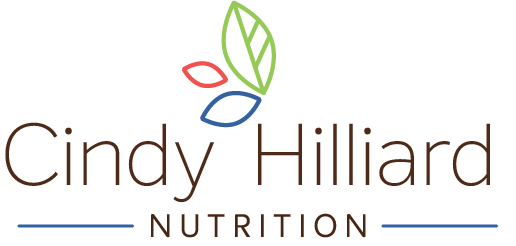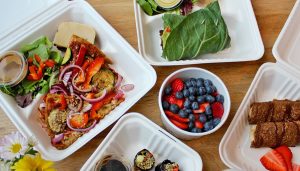The school year is well underway. Besides school supplies and classroom tools, it’s important to make sure our kids’ brains are set up for success too—especially after last school year being what it was!
Kids’ brains need good nutrition to function properly, and the same foods that are great for the body are also great for the brain! Taking care of your brain as you would the rest of your body can help you maintain stable moods, prevent depression and anxiety, and reduce the symptoms of ADD/ADHD. Good nutrition is especially important for kids—their brains are still developing.

Think of each meal as an opportunity to eat as many nutrients as possible. As you will notice, most of my favorite brain foods for kids contain an abundance of healthy fats or bright colors. The brain is 60% fat, so It’s no coincidence that the brain needs fats and fat-soluble nutrients for optimal function. Don’t be afraid of (healthy) fats! Your body needs them to be healthy and so does your brain.
The rich color in many nutritious fruits and vegetables comes from phytonutrient pigments like lycopene, anthocyanin lutein, and beta carotene. It’s these plant pigments that actually provide the brain-boosting nutrition! Try to serve a wide variety of brightly colored vegetables and fruits for maximum benefit.
There are hundreds of foods that provide benefit to the brain, but I included the ones listed below because they are great for supporting brain function and they are foods that kids might actually eat! Try to incorporate them into your kids’ diets on a regular basis!
Walnuts
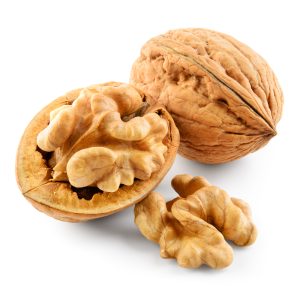
Walnuts are a good source of magnesium, vitamin E, and omega 3 fatty acids that help improve mental alertness and improved cognition. Numerous phytonutrients in walnuts are anti-inflammatory which can contribute to improved cognitive function. Try sprinkling crushed walnuts on oatmeal or yogurt, or using them in homemade granola.
Avocado
Lutein, the carotenoid that gives avocados their yellowish green color, helps improve memory and concentration. Avocados also contain folate (B9) and vitamin K, both of which help improve memory and cognition. They are also packed with monounsaturated fats that keep blood sugar levels stable, which can prevent mood swings. Serve avocados sliced as an addition to a sandwich or simply on the side, or as guacamole.
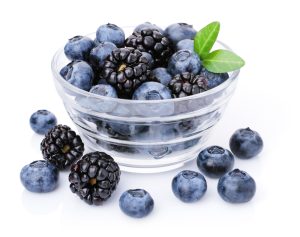
Blackberries & Blueberries
Blackberries and blueberries contain some of the highest levels of antioxidants of any fruit. Antioxidants help reduce inflammation and oxidative stress, and therefore can improve brain function. The phytonutrient anthocyanin, the deep blue or purple pigment, can help improve focus and working memory. (1)
Eggs
Egg yolks are one of the most concentrated food sources of choline, a nutrient that is converted by your body into acetylcholine, a neurotransmitter that helps regulate memory and mood. Pasture-raised eggs contain Omega 3 fatty acids (much more than their conventionally raised counterparts), B vitamins including choline, B-12, & B-2, vitamin D, vitamin A, and minerals selenium and iodine. These nutrients all support brain health. That’s a lot of nutrition packed into one perfect little package. Even better—cook ‘em up in some grass-fed butter!
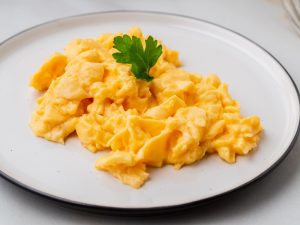
Look for locally raised eggs from a local farmer if you can—direct from the farm or at a farmer’s market. Even if the eggs are not certified organic, just ask—many farmers raise their hens on pasture according to organic standards, but are not actually certified organic because of the high cost of getting certified. This means you’re getting high quality eggs for a better price. Pasture-raised eggs can be found at most supermarkets as well, but are usually fairly expensive. For the best nutrition, look for eggs labeled pastured or pasture-raised. Vital Farms is a reliable brand of eggs available at a supermarket.
Yogurt and kefir
Probiotic-rich yogurt and kefir support a healthy gut flora. Fermented foods can contain millions or even billions of good bacteria! A healthy and diverse gut microbiome is essential for a healthy brain! Did you know your gut and brain are directly connected via the Vagus nerve, and that most of the “feel good” neurotransmitter, serotonin, is produced in the gut? This is just one example of the gut-brain connection, but it’s important, so keep your digestive system happy!
When choosing yogurt and kefir, look for varieties that are low in sugar (8g or less per serving), are made from whole milk (at least 4% fat), and are preferably made with non-homogenized milk from grass fed cows. If you haven’t tried kefir, it tastes like drinkable yogurt, but it is made with different probiotic cultures and is fermented by a different process than yogurt, so incorporating both yogurt and kefir in your child’s diet helps provide a wider variety of healthy bacteria for a more diverse and healthy gut. Try Siggis Icelandic yogurt (4% fat or triple cream varieties), Dreaming Cow grassfed yogurt, and Lifeway whole milk kefir.
Dark chocolate
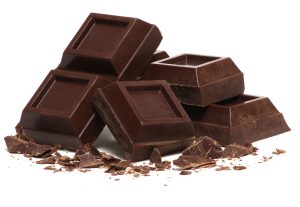
Yes chocolate! Cacao is a great source of magnesium and flavanols. Magnesium is necessary for the regulation of neurotransmitters, that send messages through the nervous system and brain. Magnesium also promotes relaxation and sleep, which are both important for optimal brain function.
Cocoa flavanols have anti-inflammatory and antioxidant effects, and improve cognitive function. The flavanols in chocolate accumulate in the brain centers that control learning and memory. A 2017 review (8) suggests that these flavanols in dark chocolate, can also help improve the brain’s reaction time.
When selecting chocolate, be sure to choose chocolate that is at least 70% cacao to reap the benefits. The health benefits of chocolate with lower cacao percentages are greatly reduced because of the high sugar and milk content and low amounts of cacao present. (2, 3)
Butter
Besides providing both short term and long-lasting energy, grass-fed butter can help improve mental focus. It contains fat-soluble vitamins D, A, and K-2, and Omega 3 fatty acids. Another fatty acid found in butter, butyric acid, is a powerful anti-inflammatory agent that can improve brain function. Adding healthy fats like butter to each meal can also help stabilize blood sugar throughout the day, which can help reduce mood swings. (4)
Be sure to choose butter from made from the milk of grass-fed cows—the nutrient profile is quite different than that of conventionally raised cows—the omega 3 and fat-soluble vitamin content is much higher! Try these easy-to-find brands for quality and nutrition: Kerrygold, Organic Valley Pasture Butter, or Vital Farms.
Coconut oil
Coconut oil contains medium chain triglycerides (MCTs), which help provide fuel for the brain. The MCTs are easier to digest than many other fats allowing them to quickly break down into ketones, which can be used by brain cells for fuel (5). Coconut oil is also helpful for memory and reducing inflammation. It can be used for cooking and baking.
Sweet Potatoes
Not only do they contain high levels of many vitamins and minerals, but sweet potatoes contain betacarotene (which is converted into vitamin A) and anthocyanin, phytonutrients that serves as an antioxidant and anti-inflammatory agents, which in turn can help reduce oxidative stress in the brain. Purple sweet potatoes contain even more anthocyanin. Even though they are sweet, sweet potatoes have a low glycemic value meaning that they don’t cause dramatic blood sugar spikes in most people.
Try serving sweet potato as fries, roasted or baked as a much healthier alternative to white potatoes.
Water
Not exactly a food, but really important for cognitive function. Since your brain is mostly water, drinking it helps you in a number of ways, including to help improve concentration, cognition, mood, and memory. Proper hydration also ensures adequate blood flow to the brain. Try swapping out water for sugary drinks! Try adding a splash of juice if your kids don’t like it plain.
If your kids are not picky include these foods too!
Salmon, sardines, and mackerel
Salmon sardines, and mackerel contain high levels of omega 3 fatty acids. Omega 3s are essential to building brain cells. They have also been shown to reduce ADD/ADHD symptoms in children, and are essential for learning and memory.
Broccoli and other cruciferous veggies
The high amounts of vitamin K and choline in broccoli help improve memory, and its folate content can help improve mood and cognition. Broccoli is also loaded with antioxidants that can help reduce inflammation, which in turn can improve overall brain function.
Overall, try your best to serve your family real, whole foods and incorporate these foods for extra superfood nutrition!
Try my kid-friendly healthy recipes
Hidden Veggie Breakfast Casserole
Superfood Sloppy Joes
Carrot Cupcakes
Grain Free “Pop Tart” Pastries
Sources:
2. https://www.ncbi.nlm.nih.gov/pubmed/23810791
3. https://www.frontiersin.org/articles/10.3389/fnut.2017.00019/full
4. https://pubmed.ncbi.nlm.nih.gov/20463040/
5. https://nyaspubs.onlinelibrary.wiley.com/doi/full/10.1111/nyas.12999
Links on CindyHilliard.com may be affiliate links. See full disclaimer here.
Cindy Hilliard Nutrition is a participant in the Amazon Services LLC Associates Program, an affiliate advertising program designed to provide a means for sites to earn advertising fees by advertising and linking to amazon.com
